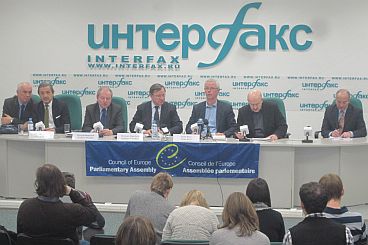Tiny Kox in Russia: Day 5, Action not words
Tiny Kox in Russia: Day 5, Action not words
SP Senator Tiny Kox is in Russia once again to prepare for a Council of Europe observer mission, this time for the presidential elections scheduled for 4th March. He will report daily for the SP website.

Tiny Kox in Russia: Day 5, Action not words
In three weeks the Russian people will elect their new president. “Anything is possible, but nothing is certain,” is what I told the closing press conference in Moscow. Plenty of good intentions – but after the words the time comes for action.
On the way to Sheremetyevo airport, I realise that the foreign election observers will have a rather modest role to play on 4th March. Much more important will be the 10,000 domestic observers in the 100,000 polling stations and at the regional election committees to which the Bllot boxes will be ferried when the polls close at 8 p.m. Our presence, however, is seen as important by these observers.
There are more observers than ever, and in the wake of all the protests and debates, they are much more motivated than they were before. If things go wrong, we’ll hear about it more quickly and more clearly, that much is now certain. The whole country is watching, not only via the webcams in every polling station, but above all through the eyes of these observers. If on March 5th their observations and ours agree, then no-one will be able to go doubt them, is the general feeling that we’ve come across in Moscow this week.
Watch a part of the press conference on NOS.nl
At the press conference in the Interfax building I summarise what we have done this week at the invitation of the Russia parliament. We’ve spoken with four of the five presidential candidates and with the President of the Duma, visited the President of the Electoral Council, interviewed the national ombudsman for human rights, met with domestic election watchdogs, and asked journalists for their thoughts. We are not yet ready, today, to draw conclusions from this flood of information. We’ll be back at the end of February in order, together with the people from the OSCE, who have been here for weeks following developments around the presidential elections, to be here for the last days of the campaign and for election day itself.
In response to questions I go on to say that the atmosphere has been great all week, and that our earlier criticisms have been received positively. As for why Premier Putin has not found the time to meet with us, that was for him to say. We were missing his defence against the other candidates’ criticisms. As for the President of the Electoral Council, regarding this week I had no complaints, but when it came to the organisation for which he was responsible, I had quite a lot. Whether candidates had followed all the rules, I didn’t know. That these rules were too rigid and should go, more or less everyone agreed, President Medvedev more than anyone. His proposals for political reform are important in my view, but whether they’ll go through remains to be seen. And most of the proposed changes would only be brought in after the presidential election, so there’s no reason to applaud just yet.
Asked what the result would be on 4th March, I say I have no idea and that actually we have as observers no interest in this. What is of interest and importance is that every vote counts, and that every Russian can trust this. As long as that trust is absent, any result will be controversial, which is bad for the voters and bad for the candidates. Then we’ll see what all the fine words were worth, not to us but to the Russians themselves, as is fitting.
